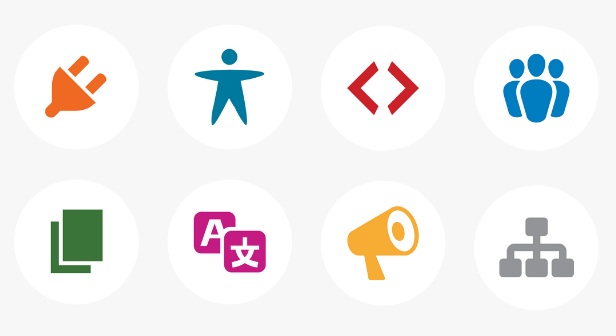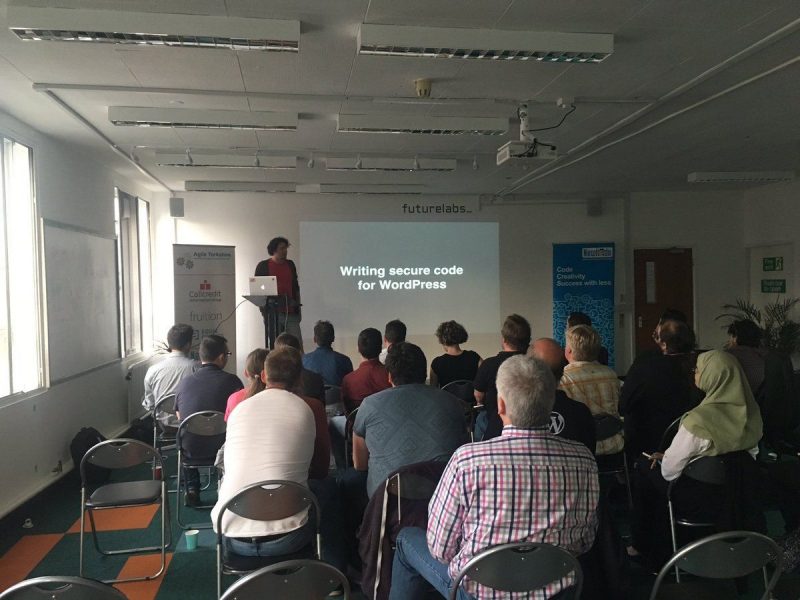Contributing to open source occurs in a range of ways; more traditionally it may involve forums, patches, documentation, translations and bug reports. But it also includes;
- Organising events
- Donating financially
- Speaking and volunteering at conferences
- Writing about adopting open source and about contributing
- QA and testing
- Moderating discussions on conversation channels
- Writing tutorials
- Managing projects to move them along and clarify issues
- Designing layouts and interfaces to improve usability
A human approach to contributing
As we reach 60+ people, we’ve been exploring more effective ways we can track the contributions we’re doing on an individual level, so we can see how we’re contributing as a whole. Not because we want to track anyone’s time, or micromanage what people are doing; but because we wanted to really understand the ways in which we were actively participating towards the health and continuity of WordPress. This conversation led us to ask questions about how we contribute as a whole; and how, looking back to the last seven years, it’s become an integral part of who we are and how we work.

Human Made team photo, 2014.
We haven’t always had the same capacity to contribute, but we’ve been doing so – unsystematically – since we were four people in a small office in Matlock. And when we explored the reasons for this, it boiled down to the fact that contributing had never been a strictly defined part of our business strategy. We just did it because it felt natural and instinctive; and it went from instinctive, to seamlessly integrated into our daily workflows.
Today, we can look back and see the effect this has had on the projects we’re doing, the clients and partners we’re working with, and on the growth of our team. It’s showed us that our sense of responsibility to open source helped provide an environment whereby individuals feel supported to contribute; which in turn, has positively impacted our business and helped us achieve our business goals. This culture has permeated every area of our agency and appealed to a range of skilled professionals who have since joined us, and a variety of partners and clients eager to support what we do.
What we do
When we break it down into individual projects and into one year (2016), it looks something like this.
We were actively involved in the following WordPress.org teams:

WordPress.org contribution badges
- Core
- Accessibility
- Documentation
- Polyglots
- Community
- WP-CLI
We open sourced these tools:
- Tachyon – Image resizing service running on AWS
- CMB – Enables you to easily create custom meta boxes with custom fields
- coding-standards – Human Made coding standards for modern code
- Cavalcade – A better wp-cron. Horizontally scalable, works perfectly with multisite
- Mercator – WordPress multisite domain mapping
We were also involved in organising seven WordCamps around the world, including:
- WordCamp Europe
- WordCamp Singapore
- WordCamp London
And seven local meetups, including:
- WP Leeds
- WP Melbourne
- WP Auckland
- WP_Hooked

WordPress Leeds
We spoke at 33 events and conferences, here are just a few:
- PHP Phillipines
- WordCamp Sydney
- WordCamp Tokyo
- Alterconf Dublin
We also organised these community events:
- WP Translation Day 1
- WP Translation Day 2
- Big WP Meetup London
- Out of Office – a free conference on remote work
And we published two free white papers:
Why we do it
We contribute because it has become naturally integrated into our daily workflows. Using WordPress every day means coming across bugs or issues frequently; so fixing something broken became an instinctive part of how we worked. This is how it started, and we’ve continued because we’ve seen a multitude of benefits in the long-run. Here are some of the most impactful ones;
Contributing to learn, develop and improve skills
Open source collaboration is an excellent way for team members to try their hand at a new skill, or work on a project they’d otherwise not get the opportunity to work on. As we contribute we learn valuable skills to enable us to work more effectively as a team and become more well-rounded individuals. We learn about cross-cultural communication, which is vital to our distributed team members, and we improve our communication and management skills.
Contributing TO develop expertise in the software
Our participation in the project has given us a unique perspective and understanding of how WordPress works, and its strengths and limitations. This feeds positively back into the work we do for our clients. And we’ve written it into policy as well; whether or not an individual developer contributes to open source, all our client projects operate on a 4 day week, ensuring our developers have ample opportunity to continue working on open source, should they want to.
Contributing as a social responsibility
It makes clear sense to us that if you’re using something for free, there is a responsibility to ensure you’re contributing as well as consuming. We’ve always felt bound by this responsibility and wanted to be a part of the ecosystem using and building WordPress.
Maintaining the health of open source
Open source projects and software are driven by people; they do not run themselves. It’s important, as simple as this idea is, that we remember that we shouldn’t ‘leave things for others’, or that we dispel the myth that ‘someone else will pick it up’.
We’ve always felt it was important to continue driving the health and direction of WordPress and open source projects: it makes perfect sense for the health of our business, as well as the health of WordPress.
People first
We encourage people to contribute actively to open source projects – but we don’t force them. Being people first means giving people the freedom and liberty to manage their time in a way which aligns with the business goals. This attitude has helped attract some of the most well-respected professionals in the WordPress ecosystem and provided an environment where they are able to contribute as part of their role in the company.
A strategy for well-rounded success
We understand that not everyone has the ability or capacity to contribute in such a way. We see it as an investment in our own future, so it’s a priority for us to do so. And it quickly became clear to us that the positive impact was priceless. Our support for our contributing team members has meant attracting high-calibre professionals and maintaining strong retention rates for seven years. It has also been extremely attractive to a range of enterprise organisations eager to support what we do. And it’s one of the most impactful ways we’ve grown and maintained a positive community standing across WordPress communities, globally.
Most importantly, we’ve realised contributing to open source projects enables benefits to flow both ways: both to and from the open source project, and the organisation contributing.
Here are a few ways you can integrate Contributions into your workflow
- Report an issue/bug when you find it – the first step is identifying what is wrong, and the next step is reporting it. It can be anything from a line of code to a specific phrase in a document.
- Do a show & tell at your local meetup – let others know what you’ve been doing recently, and what you’ve learnt. Transferring knowledge is one of the most important ways to improve and help the community.
- Answer questions – visit support forums and answer questions. Did you have a support question you didn’t get a reply to? Did you find a solution? If so, update your original request with what you’ve learnt!
Good luck!
This post was co-authored by Ana Silva.